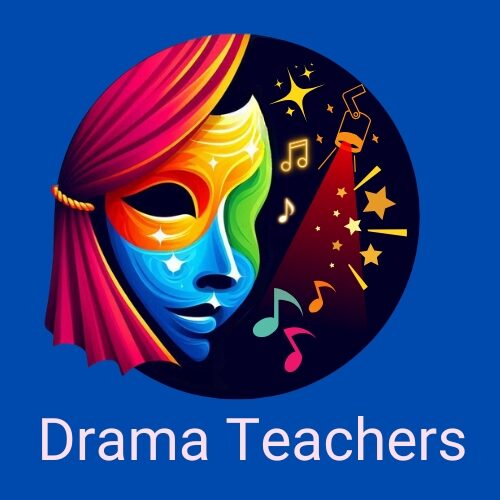I’m a drama teacher. I’m clearly biased, but I think that drama should be included in school curriculums – EVERY school curriculum – and here’s why!
Creative subjects like drama ignite innovation and creative thinking in ways that many traditional subjects often do not. Drama pushes students to think outside the box, fostering personal growth, critical thinking, and emotional intelligence. It can build confidence and self-esteem and teaches what are arguably the MOST IMPORTANT things for anyone to learn which is LIFE SKILLS.
While the ‘core’ subjects of English, Maths and STEM frequently take centre stage in all educational policy making, drama plays an equally important role in developing well-rounded individuals. In fact more so, because it encourages an understanding of different ideas, people and world views. It can teach history, art, science, English and Maths in a single play! In a world needing empathetic leaders and innovative thinkers, drama provides invaluable skills that extend far beyond the classroom.

1. The Unique Benefits of Drama Education
Drama is not just about being an actor as many people first assume when you tell them you like drama. “Oh, so you want to be an actor?” they say. But many people who love drama would never consider being an actor – any more than the majority of people in the athletic stands would seriously want to be an Olympic high jumper. They like it for other reasons. It’s true that many DO want to be actors and I love that, but I’m talking about the benefits that drama brings to everyone, from all walks of life and with a multitude of career ambitions.
Drama for life
Beyond performance, drama helps students explore their own identities and how they relate to others, laying a foundation for success in all areas of study. I had a student once who was a great actress and could have done it as a profession, but her heart lay in physics. She got her degree in England and later went to the US to study astrophysics and to this day, is still operating in the high echelons of this arena. I tell you this because on a visit home from university once, she told me that she was really grateful that she had studied drama because she was the only one on her course who could stand up and give a public presentation with any clarity and confidence. That’s what drama can teach, and it doesn’t matter what subject you want to talk about – drama will give you the skills to do it well.
Drama can augment other subjects
Studies from the American Alliance for Theatre & Education indicate that students involved in drama are more likely to excel academically and socially. Drama improves reading comprehension, fosters empathy, and enhances verbal communication skills, equipping students with the tools to navigate diverse social and professional environments.

2. Drama As A Cultural Staple
Drama extends beyond school stages into film, TV, music, art and theatre – the media that reflect and critique society and has done so for thousands of years. When people tell me that they don’t think drama is worthwhile, I ask them what they do when they get home. Mostly they’ll tell me that they turn on the TV or listen to music, and I point out to them that without drama and the performing arts, they would have to rethink most of their leisure activities!
By engaging with any of these forms, students develop:
- A deeper appreciation of cultures and philosophies
- The ability to critically analyse societies and people’s motivations
- Stronger communication and empathy skills
Understanding drama allows students to see media not just as entertainment but as a mirror of the cultural values and social challenges that exist in their own communities and the world at large. As playwright and educator, Augusto Boal said, “Theatre is the art of looking at ourselves.” Engaging with drama enables students to reflect on human experiences and gain a deeper understanding of themselves and others which are truly needed if we want to learn to live together more peacefully. What is needed is not more military strength, but more tolerance and understanding.

3. Drama as a Teacher of Life Skills in the Digital Age
When you participate in drama, you develop many useful life skills such as:
- Critical thinking through play analysis and studying the context in which decisions are made
- Emotional intelligence by understanding the deepest aspects of motivation and characters’ behaviours
- Teamwork skills from working together with a single purpose
- Creativity by actively inventing and creating new work
- Confidence by standing in front of an audience and
- Technical skills through the use of lighting, sound and stage management
- Practical skills like carpentry, model making, costume making or make-up
Since drama mimics life, there is really no area of life that can’t be understood better through drama – whether it’s a play about climbing Everest or the life of a simple peasant – drama has got it covered!
In an era dominated by technology, the ability to connect with others is crucial. Drama teaches these essential interpersonal skills.
A study from the University of Sydney found that students engaged in drama displayed higher levels of self-confidence and adaptability, critical qualities for success in an increasingly digital and globalised world. According to a report by the OECD, students with access to arts education, including drama, demonstrate better problem-solving abilities and creativity, key components of success in any workplace.
The therapeutic reports that schools with robust drama programs see higher engagement levels and improved academic performance across disciplines.

4. Drama As An Economic Powerhouse
The performing arts industry is a vibrant and ever-evolving sector that encompasses a variety of forms, including theatre, dance, film and TV, music, opera, and circus. It reaches a global market and the UK, although only a small island, has a unique input into this industry.
Global overview
The global performing arts market is projected to reach USD 269.23 billion by 2030, growing at a compound annual growth rate (CAGR) of 5.67% from 2025 to 2030. This growth is fueled by the rising demand for live entertainment, advancements in digital technology, and the diversification of performance genres.
Key data:
- Market Size: Anticipated to hit USD 269.23 billion by 2030.
- Digital Transformation: The integration of digital platforms for streaming performances, online ticket sales, and virtual experiences has revolutionised the industry in recent years, fuelled by innovations coming out of the pandemic.
- Regional Markets: North America leads the market, followed by Europe and Asia-Pacific.
- Live Performances: We are witnessing an increasing appetite for live dance performances, offering audiences both entertainment and escapism.
- Consumer Interest: In December 2023, 7% of respondents in the U.S. reported purchasing admissions to theatre, ballet, or opera shows.
UK specifics
The UK has a rich tradition in the performing arts, with the West End in London being a major hub for theatre enthusiasts. Despite challenges brought about by the COVID-19 pandemic, the industry has shown resilience and continues to contribute significantly to the country’s economy.
Key Insights:
- Theatre Attendance: London’s theatre attendance increased by 7.2% since 2019, with 16.4 million visits in 2022.
- Economic Contribution: The arts and culture sector contributed an estimated £11.5 billion to the UK economy in 2022, up £1.5 billion from 2019.
- Earned Income: UK theatres generated approximately £303 million in the 2022/2023 financial year, a significant recovery from the £49 million during the pandemic years.
- West End: Continues to thrive with popular productions like “Moulin Rouge! The Musical” and “Mean Girls.”
- Employment: In 2023, the UK performing arts industry saw a 4.5% annual decline in employment, with approximately 64,000 jobs recorded between July 2022 and June 2023. This could be due to the downturn in government funding for arts projects which has hit many of our institutions.
The performing arts industry, both globally and in the UK, is not only a testament to human creativity and resilience, it’s a major economic force. It continues to adapt and flourish despite economic fluctuations and external challenges that successive governments bring in. As digital platforms and live performances merge, the future of this industry promises to be as dynamic and captivating as ever.
For more information, see the references for the data you mentioned:
- Global Performing Arts Market Size by 2030:
- UK Performing Arts Industry Employment in 2023:
- London Theatre Attendance in 2022:
- Economic Contribution of Arts and Culture in the UK in 2022:
- Earned Income of UK Theatres in 2022/2023:

5. Drama As Therapy
Drama can also be used in therapeutic environments and is a powerful technique that uses the creative process to help people explore and address their personal and emotional challenges. Through role-playing, storytelling, improvisation, and performance, participants can safely express their thoughts, feelings, and experiences in a supportive and non-judgmental environment.
This form of therapy also encourages self-awareness, emotional resilience, and empathy, helping people to gain new perspectives on their situations and develop healthier coping strategies.
Drama therapy has been found to be effective in treating a variety of mental health issues, including anxiety, depression, trauma, and social anxiety, as it allows individuals to experiment with different roles and scenarios, ultimately helping their personal growth and healing traumatic situations.
Drama can also help children with additional needs or disabilities (SEND) to feel included, express themselves in ways other than conventional writing, and gain social skills.

6. Leading Voices Advocating for Drama Education
It’s not just me that argues why drama should be included in school curriculums. Many other experts and commentators highlight the importance of drama in education. Sir Ken Robinson, a major advocate for creative education, argued that “Creativity now is as important in education as literacy, and we should treat it with the same status.” He fought against dropping drama and creative subjects from school curriculums.
His view is supported by research from the Education Endowment Foundation which highlights that participation in drama and the arts can lead to improved literacy and numeracy skills, demonstrating that engagement in creative subjects positively impacts overall academic achievement.
Educational psychologist Howard Gardner’s theory of multiple intelligences supports this, emphasising that intelligence isn’t just linguistic or mathematical—it includes artistic, interpersonal, and spatial intelligences, all of which are things that drama, and often only drama, nurtures.
Studies and testimonials show drama’s impact on:
- Boosting self-confidence and teamwork
- Enhancing emotional intelligence and cultural awareness
- Creating inclusive classroom communities where students support one another
The National Endowment for the Arts has found that students who participate in drama are more likely to succeed academically and socially, reinforcing its importance in education.
Dame Judi Dench, a strong advocate for drama in education, has stated, “The arts enrich the curriculum, making students better able to think creatively and express themselves confidently.” These skills are invaluable in all walks of life, not just within the creative industries.

7. The Need for a Broader Curriculum
I am passionate about education. But education must evolve to meet the demands of our modern world. We are no longer living in the 1950s! While academic knowledge is important, 21st-century skills like innovation, creativity, empathy, and adaptability are more critical.
A well-rounded curriculum should:
- Integrate drama alongside so-called ‘core’ and STEM subjects
- Encourage students to think critically about social issues
- Equip students with creative problem-solving abilities
- Give them the skills to operate as human beings with confidence and self-esteem
Progressive education systems increasingly recognise the importance of the arts in preparing students for diverse career paths and giving them life skills.
There has been a worrying increase in students suffering from mental health problems in recent years, and the push to try to fit everyone into the same box in order to advance league tables and make education an industry is to blame in my opinion.
We are all different – some of us love Maths (I’m one of those people too). But many, many people find their life purpose is drama, the arts and other creative subjects. We must stop imposing a narrow, 1950s view of the world on our young people and acknowledge the value of creative arts subjects. Without this, we are systematically telling these people that what they want doesn’t matter, and the talents they have, are not as valued or as good as people who excel in the so-called ‘core’ subjects.
The Calouste Gulbenkian Foundation and A New Direction published “The Arts in Schools: Foundations for the Future” in 2023. This report calls on policymakers to recognise and enhance the value of arts education as part of a comprehensive re-evaluation of the UK education sector.
Reflecting on policy developments over the past four decades since the influential 1982 Gulbenkian report, “The Arts in Schools: Principles, Practice and Provision”, the new publication highlights the crucial role that the arts have played in securing their place in the UK National Curriculum and fostering a new ecosystem of education teams within cultural organizations.
Drawing from extensive research, including a series of roundtable discussions with heads of schools and multi-academy trusts, teachers, academics, arts educators, and young people, the report finds that the arts are essential for young people’s intellectual and personal development. However, it also reveals that the arts are currently marginalised in today’s school system, which is in dire need of a significant overhaul.
Whilst this report focuses on the UK, I suspect that this report could be echoed around the world in its call to action for better drama and arts in schools.

8. How to Advocate for More Drama in Schools
Ensuring drama remains part of the curriculum requires proactive efforts on behalf of all interested parties. If you are a drama (or creative/performing arts teacher) – that means YOU. And I call on everyone else who is dismayed by the narrowing of the current curriculum and the shrinking of the ‘hoops’ our children have to get through to be recognised and accepted by society. THINGS HAVE TO CHANGE!
If we stand up for what we believe in and work together, we can rebalance the boat. Here are some ways we can make a difference:
- Engage decision-makers – Highlight drama’s benefits to school administrators and policymakers
- Present research – Use studies showcasing drama’s impact on confidence, collaboration, and critical thinking. I have given a lot of research here that can be used to back up your arguments.
- Challenge conventions – Ask your schools why they don’t offer more drama and arts subjects, or why they are always the ones that get dropped first.
- Build a coalition – Work with parents, teachers, students and members of the drama and arts community.
- Encourage student involvement – Their voices add weight to advocacy efforts and they are the policymakers of the future.
- Join in with research or action days – Take a stand and make your voice heard. Join a local, national or international action group advocating for more drama/arts education.
- Spread the word – Use social media to raise awareness and share this post with as many people as possible to get the word out.
- Be proactive – Introduce drama or arts as an after-school club or integrate it into existing classes can serve as stepping stones to making it a core subject.

9. Conclusion: Education Should Not Be One-Size-Fits-All
Traditional ‘core’ subjects do not cater to every student. Many fall by the wayside when forced to engage in them, and this can lead to them developing poor self-esteem, mental health problems and/or dropping out of the education system altogether. This cannot be the way we educate our young people in the 21st century.
I know very intelligent young people who have struggled with their education because their amazing talents in drama and other creative arts subjects have not been given the recognition they deserve. These people leave school feeling dejected, inferior and ‘not good enough’. My view is that we have failed these young people totally because of our narrow view of what an education should be!
Drama and other arts subjects provide an avenue for students to excel in ways conventional subjects might not allow, fostering individuality, creativity, self-expression, and abstract thinking. Encouraging students to explore drama acknowledges their unique talents and prepares them for a future that values diverse skill sets.
By broadening educational approaches to include drama, we create a generation of individuals who are not only knowledgeable, but also socially aware, emotionally intelligent, and creatively equipped to drive positive change.
WE OWE IT TO OUR YOUNG PEOPLE TO CREATE AN EDUCATION SYSTEM LIKE THIS.

10. References and More Information
Here are some references and links to studies and organisations that support the benefits of drama education:
- American Alliance for Theatre & Education (AATE):
- The AATE provides resources and research highlighting the positive impact of drama on students’ academic and social development.
- aate.com
- Education Endowment Foundation (EEF) – Arts Participation:
- The EEF’s research indicates that arts participation, including drama, can have a positive impact on academic outcomes, particularly in English, mathematics, and science.
- educationendowmentfoundation.org.uk
- Educational Theatre Association – The Impact of Theatre on Student Success:
- This article discusses how theatre education enhances students’ sense of community, empathy, confidence, and academic performance.
- schooltheatre.org
- Arts Education Partnership – Theatre Counts:
- Theatre education helps young people develop a strong sense of self, build empathy, and broaden their understanding of the world.
- aep-arts.org
- San Diego Family Magazine – 5 Benefits of Theater Arts:
- This article outlines how theater training helps children gain confidence, build camaraderie, learn leadership, practice teamwork, and develop skills applicable beyond the stage.
- sandiegofamily.com
11. Relevant books and talks
I have listed many resources throughout the article. Here are a few additional ones.
Books
- Neelands, J. (2000) Drama as social intervention. London: Routledge.
- Winston, J. (2013) Second language learning through drama. London: Routledge.
- Bolton, G. (1998) Drama for learning: Dorothy Heathcote’s mantle of the expert approach to education. Portsmouth, NH: Heinemann.
- O’Toole, J. (1992) The process of drama: Negotiating art and meaning. London: Routledge.
- Fleming, M. (2017) Starting drama teaching. London: David Fulton Publishers.
- Robinson, K. (2009) The element: How finding your passion changes everything. New York: Viking.
- Robinson, K. (2015) Creative schools: The grassroots revolution that’s transforming education. London: Penguin.
- Robinson, K. (2011) Out of our minds: Learning to be creative. Chichester: Capstone
Articles
- Lewis, Martin and Rainer, John. Teaching Classroom Drama and Theatre: Practical Projects for Secondary Schools.
- This book offers practical projects and lesson plans for teaching drama in secondary schools, emphasizing the importance of drama education in contemporary society.
- Bacon, Sally and Tambling, Pauline. The Arts in Schools: Drama in Schools.
- This article discusses the role of drama in schools and advocates for drama to have equal subject status to other arts.
- Jo Lee. Powering through: advocating for our subject
- This article highlights the need for a National Plan for Drama Education and discusses the barriers to accessing drama education.
- National Drama. National Drama’s Response to the Arts in Schools Review
- This article responds to a review of The Arts in Schools report, advocating for drama to be recognised as an art form in its own right and included in the curriculum.
- Sir Ken Robinson. All Our Futures: Creativity, Culture and Education–
- A report by Ken Robinson on the significance of creativity in education.
- Belfast Department of Culture, Arts and Leisure. Unlocking Creativity: A Strategy for Development
- A strategy report for creative and economic development.
- Calouste Gulbenkian Foundation. The Arts in Schools: Principles, Practice and Provision
- An article arguing for the inclusion of arts in school curricula.
- National Association for the Teaching of Drama (NATD). The Journal for Drama in Education
- This journal publishes both theoretical articles and practical work that engage with all aspects of drama in education. The latest issue includes articles exploring the development of drama in education from various perspectives.
Talks
- Sir Ken Robinson. Do Schools Kill Creativity?– This is his famous TED Talk from 2006, where he discusses the importance of nurturing creativity in education.
- Sir Ken Robinson. 10 talks on education– A playlist of 10 talks curated by Ken Robinson himself, featuring various insightful and creative educational ideas.


Hello Gail!
I completely agree with the idea of including drama in school curriculums! It’s such a powerful tool for developing essential life skills like communication, empathy, and teamwork. I’ve seen how acting helps kids build confidence and express themselves in ways they might not have thought possible.
I personally am homeschooling and would love for my kid to either want to explore drama when he gets older (he is 5 and currently in kindergarten) or for us to explore it together as it is a subject that I have been exposed to but never really explored.
For schools that may not have the budget for theater programs, do you have any suggestions for making drama more accessible?
Angela 🙂
Hi Angela. Thanks for taking the time to read my article and leave a comment. I’m so pleased that you can see the value of drama in education. I used to run a performing arts school that had a few children who were home-schooled. It helped them with their social skills and gave them a creative outlet and lots of friends too. In answer to your question, I know that a lot of schools struggle with budgets for extracurricular programs but there are often free or sometimes charity-funded workshops and productions that people can join. In the UK we have experienced a lot of cuts to arts projects recently which is sad and I think will have an impact in future years. I’m an advocate for more funding not less so I hope we will see this reversed soon.
In the meantime, schools can do drama with next to no funding if needed. They can also offer their facilities to local drama schools to use at a discounted rate in exchange for taking on students from their school at discounts or free places. I think it just needs a bit of bluesky thinking but everything is possible if there is a will.
Thank you for your article on why drama is important in school. You explained how drama helps students think critically, understand emotions, and build confidence. Your story about your former student, who succeeded in astrophysics but valued drama for her public speaking skills, shows how useful drama can be in real life. I have a couple of questions: In schools with limited resources, what strategies can help include drama in the curriculum without needing much funding or special facilities?
Can you give examples of projects where drama worked well with subjects like science or math to help students learn and stay engaged?
I would appreciate your thoughts on these questions.
Hi Kevin. Thanks for your thoughtful comments and I’m glad you appreciated my explanations about why drama should be included in school curriculums. The story about my student who went on to study astrophysics is just one of many that I could have told. I’m blessed to have received so many ‘thank you’ cards and letters from students over the years, some telling me of their successes in acting careers, others telling me about how they have succeeded and have confidence due to their drama stories. I also have letters from people who have said that drama saved their lives and that the fact that they could participate in drama helped them through some very dark times when they felt that they had failed at everything else. These are what drive me on in this quest.
Money is always a problem for the arts and I’m not sure why given the amount of money these subjects generate for the country. However, there are things that schools with limited resources can do. This includes partnering with other local groups and drama schools, involving parents and carers or applying for grants and funding from either local or national sources. The main thing is not to give up. You can put on a play anywhere; in a playground, classroom or playing field. You just have to think outside the box.
To answer your question about using drama in science and maths, I can give you a few examples. I have taught students who loved drama but were struggling with Maths. As a teacher of both, I used drama strategies such as learning songs to help them remember key points such as square numbers, and mean, mode and median. I also used stage directions to help them learn about bearings and angles. I have also used dance and movement to explain how matter moves between the states of solid/liquid/gas and have made drama shows to explain how bees locate flowers using the waggle dance. There really is no subject that cannot be covered using drama and theatre in education projects can really help to engage children when they might otherwise switch off.
When I worked in the medical education industry, I wrote and produced a script to introduce statins to GPs in the UK. It was based as a courtroom drama and could give the leading evidence for and against statins use for people at risk of heart disease in an easy-to-understand and engaging format.
As I said in my article – drama reflects life and can be used to communicate so much. That is why it should not be overlooked in schools.